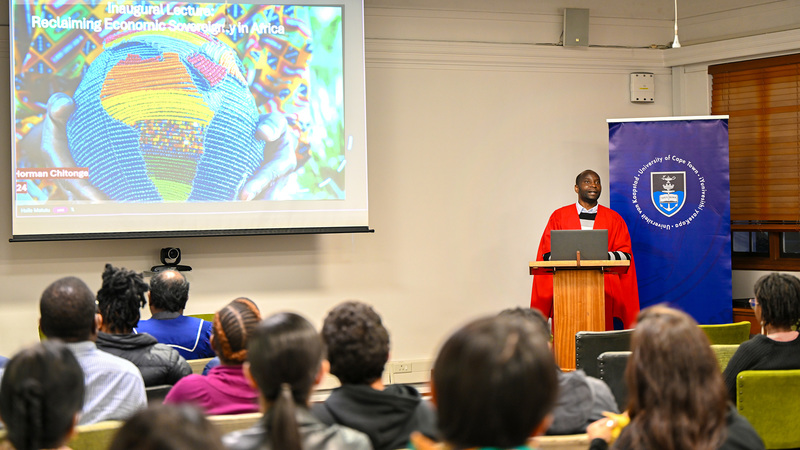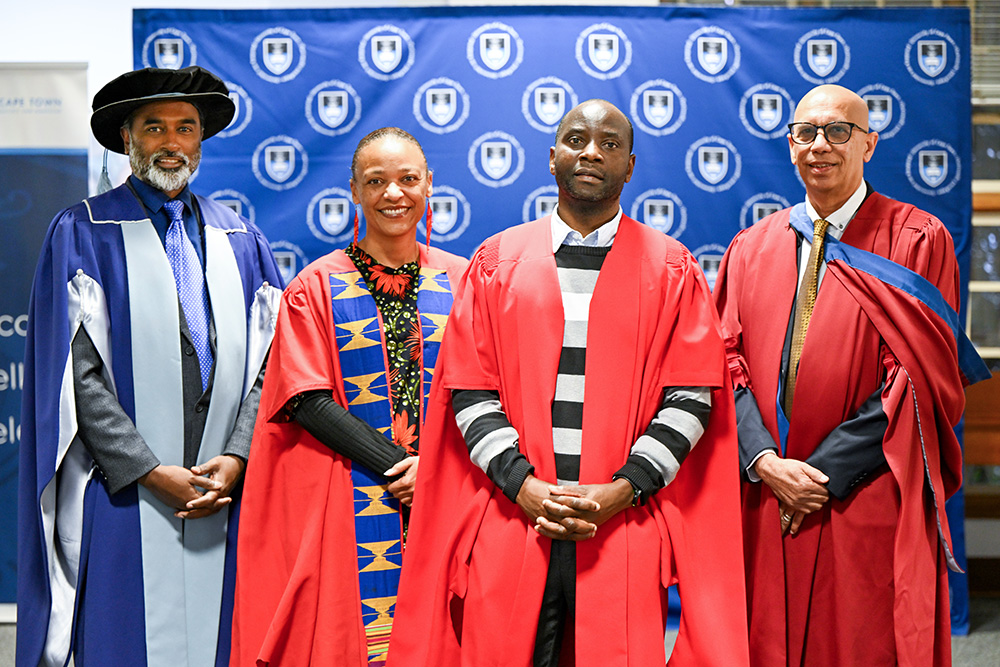Productive capabilities are pathway to reclaiming economic sovereignty in Africa
31 May 2024 | Story Kamva Somdyala. Photos Lerato Maduna. Read time 4 min.
The question on Professor Horman Chitonge’s mind as he prepared his inaugural lecture, delivered at the University of Cape Town (UCT), was: Why does Africa as a continent lack economic sovereignty when it’s rich with people and resources?
With his lecture titled, “Reclaiming economic sovereignty in Africa”, Professor Chitonge set out to illustrate how increasing high-value-added activities can strengthen economic sovereignty, engender positive structural transformation, and create inclusive and sustainable economics.
“Out of 25 impoverished countries on the globe, 22 are on the African continent. This means the continent is not producing what it should produce, yet in terms of resources, this is a rich continent,” Chitonge said. “What happens to resources and how we handle those resources are questions we must ask. It’s not just about the minerals we have; the continent also has land, water and biodiversity resources. However, the most important resource we have, is the people. We are a young and vibrant continent, and it should follow that young and vibrant people bring ideas, innovation and transformation. The future, therefore, looks promising.”
Chitonge, a professor of African Studies, focuses on strategies which strengthen sectoral linkages within and between African economies to decentre and transform the colonial economy on the continent.
“A country’s sovereignty is determined by how much economic power it muscles.”
He grappled with why the continent is not using these resources because production is done by people and the expectation is that young people ought to be more productive.
“To answer the question, I did research to find the answers and some of them are historical: colonialism. There’s also governance which is poor leadership and corruption. There’s also an issue of social institutions and a big factor here is ethnic fragmentation. Geographical variables are also at play. Given these explanations, I propose a different one: one of the major reasons is because it lacked economic sovereignty. To make progress, it must reclaim it.”
On the sovereignty framework, Chitonge said: “I proceed from the conventional idea of sovereignty, and I see it as having two key dynamics: political and economic sovereignty, with political being self-rule and territorial control whereas economics is anchored on monetary and financial sovereignty and productive capability, and these speak to how a country [can] dispose of its natural resources. I make an argument that a country’s sovereignty is determined by how much economic power it muscles.”
Transforming resources
What is economic sovereignty in this context? “Traditionally, it has been understood as the prerogative of the state to issue its own currency. This is an archaic idea. I argue it’s much broader than just monetary sovereignty. It also refers to the autonomy of a country to make decisions without pressure from other nations, including decisions of how you dispose of your natural resources,” he explained.
“And it is here where productive capabilities come into play, because without such, you have no control over what is done with your natural resources. We have the resources, but we don’t have the capability to transform them into other forms of produced capital and we end up selling them as primary commodities, in most cases, semi-processed and that takes away power of the value.”

There is also much to be said about what economic sovereignty means in Chitonge’s framework: “How do we measure economic sovereignty? I’ve put it in a negative formulation to say economic sovereignty is measured by a level of dependency; the more dependent a country is, the less sovereign it becomes. And dependency here is on many things: development, technology, manufactured products, and foreign investment.
“Strong productive capabilities help us reduce monetary and financial dependency, which is important for our economic sovereignty.”
 This work is licensed under a Creative Commons Attribution-NoDerivatives 4.0 International License.
This work is licensed under a Creative Commons Attribution-NoDerivatives 4.0 International License.
Please view the republishing articles page for more information.
Research & innovation





































